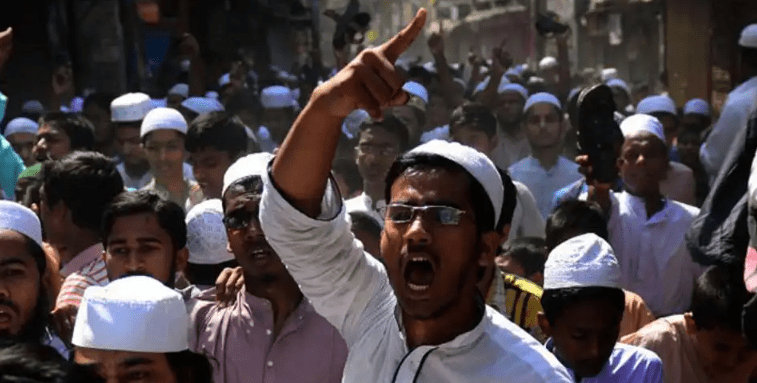
Two judges of the Bangladesh High Court have triggered a national debate with their suggestion that the parliament may consider introducing a law against blasphemy with a provision for capital punishment.
On March 12, the two-judge bench of Rezaul Hasan and Fahmida Quader made the observation during the bail hearing of Selim Khan, who was accused of hurting religious sentiments.
The 20-year-old Muslim was accused of defaming Prophet Muhammad and Quran through a comment on Facebook last November. He was arrested and charged with hurting religious sentiments under the Cyber Security Act (CSA).
The law punishes the offense with two years in jail and a fine of 500,000 taka (US$4,545).
Hurting religious feelings was already a criminal offense under the British colonial era Penal Code of 1860 with two years of punishment and an undetermined fine.
Khan was granted bail on the condition that he must pay a bank guarantee of 2.5 million taka.
The judges recited verses from the Quran in the courtroom and rebuked Khan for his derogatory remarks, saying even some of the world’s greatest scientists never raised questions about the holy book.
“The judges wanted stricter punishment for hurting religious feelings and recommended to the parliament to introduce death and life sentences,” said AKM Amin Uddin, deputy attorney general.
“Concerned by a growing number of incidents hurting religious sentiments, the judges saw in them the potential to trigger riots,” he said.
The court also recommended making religious defamation a non-bailable offense.
Hardline Islamic groups and political parties frequently rallied on the streets demanding a stringent law against blasphemy in Bangladesh, where Muslims form some 90 percent of more than 170 million people.
It was surprising to see the judges backing such a law for the very first time, said Shahriar Kabir, a journalist and human rights activist.
“The ideology of political Islam is at the heart of the demand for a blasphemy law,” Kabir said.
Several Hindu, Christian and Buddhist leaders contacted for a reaction refused to comment, saying the issue was “too sensitive” or “risky.”
There are plenty of cases both online and offline where radical Muslim clerics and their followers publicly defamed other faiths including Hinduism and Christianity. None have been sued or punished so far.
Moreover, several Hindu and Buddhist temples and houses have been attacked and vandalized since 2012 using fake Facebook posts defaming Islam. None of the cases have delivered justice yet.
An upsurge in Islamic militancy since 2013 saw some 50 people including atheist bloggers, foreigners, liberals, academics and religious minorities brutally murdered before a government crackdown neutralized the extremists.
Observers say Bangladesh’s fall from a moderate Muslim nation in the past decades has been fueled by various factors despite a ban on religion-based politics after independence.
The change began to set in after 1975 when Bangladesh’s founding leader and first president Sheikh Mujibur Rahman was assassinated.
The military regime of Ziaur Rahman lifted the ban. Rahman later founded the Bangladesh Nationalist Party (BNP), the country’s second-largest political party after the ruling Awami League (AL).
Rahman also replaced the constitutional principle of “secularism” with “Absolute Trust and Faith in Almighty Allah” in 1979.
His successor and military ruler H.M. Ershad made Islam state religion as part of incentives to promote Islam to hold on to power until his ouster in a public uprising in the 1990s.
Allowing religion-based politics marked the revival of Islamic political forces, particularly Jamaat-e-Islami, the largest Islamist political party, which opposed Bangladesh’s independence and was accused of war crimes for supporting the Pakistan military by forming Islamic militia forces during the 1971 war.
Since the restoration of parliamentary democracy in 1991, BNP and AL rotated in power.
Jamaat allied with the BNP and formed the government in 1991-96 and 2001-2006.
In 1993, for the first time, former Jamaat secretary general and lawmaker Matiur Rahman Nizami placed a blasphemy bill in the parliament and proposed life sentence for defaming the Quran and the death penalty for insulting Prophet Muhammad. The bill was not eventually passed.
That same year, feminist writer Tasleema Nasreen drew the ire of Islamists after publishing a novel Lojja (Shame), which took a swipe at radical Islam. The book was immediately banned.
Hardline groups issued a fatwa (religious edict) against her and announced a bounty on her head. Nasreen fled to Europe and later settled in India. In 2002, a court sentenced her in absentia to one year in jail for “derogatory remarks about Islam.”
In 2004, a prominent secular writer Humayun Azad was seriously wounded in a machete attack by militants near a venue of the country’s largest annual book fair in Dhaka. Azad survived the attack, but he died in a hotel in Germany under mysterious circumstances.
In 2007, leading Bengali daily Prothom Alo suspended its weekly satire magazine, Alpin, after a cartoon titled “Muhammad” enraged Islamists, sparking street protests.
Meanwhile, the AL, which ruled the country from 1996-2001 and in power since 2009, has been accused of appeasing Islamic hardline groups to solidify its support base in rural Muslim electorates.
In 2011, the AL government amended the constitution to restore “secularism” as a key principle but did not change the state religion Islam despite demands from secular forces and religious minorities.
AL government also recognized a madrasa degree as equivalent to a graduate degree, a move hailed by the Islamists.






